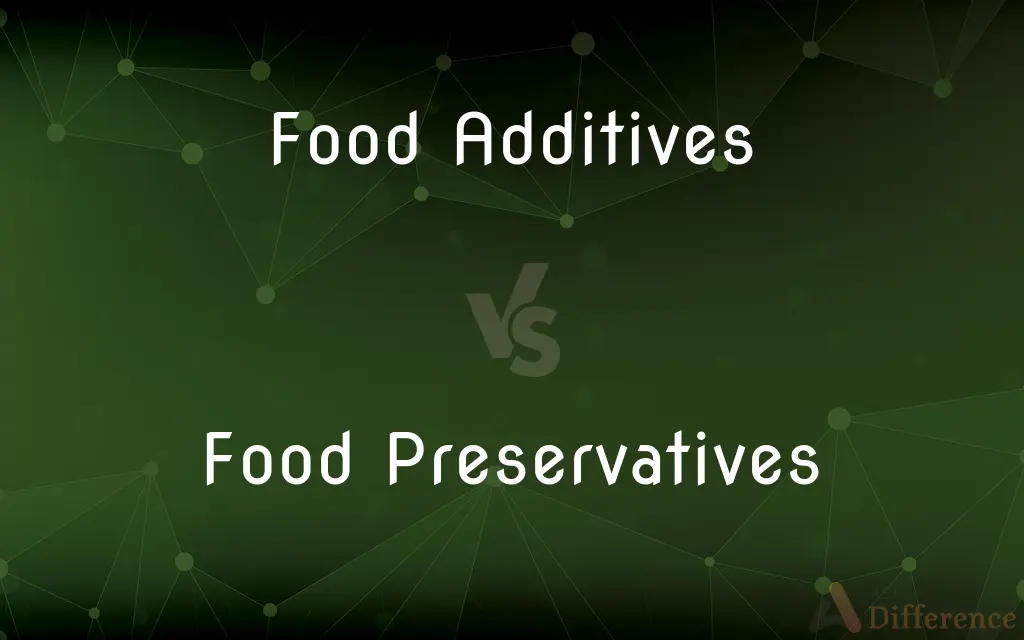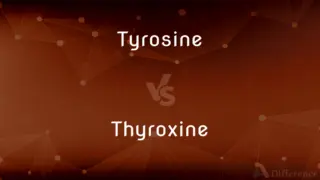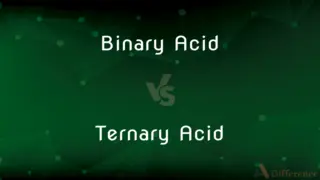Food Additives vs. Food Preservatives — What's the Difference?
Edited by Tayyaba Rehman — By Fiza Rafique — Published on January 11, 2024
Food additives enhance flavor, texture, or appearance, while food preservatives extend shelf life by preventing spoilage.

Difference Between Food Additives and Food Preservatives
Table of Contents
ADVERTISEMENT
Key Differences
Food additives improve taste, color, or texture. Food preservatives inhibit spoilage and extend shelf life.
Food additives include colorants, flavor enhancers, and emulsifiers. Food preservatives include antioxidants and antimicrobials.
Food additives enhance sensory appeal. Food preservatives protect against bacteria and oxidation.
Examples of food additives are artificial flavors and stabilizers. Examples of food preservatives are salt and citric acid.
Excessive food additives may affect health. Some food preservatives have been linked to health risks.
ADVERTISEMENT
Comparison Chart
Purpose
Enhance flavor, color, texture.
Prevent spoilage, extend shelf life.
Types
Colorants, flavor enhancers, emulsifiers.
Antioxidants, antimicrobials.
Function
Improve sensory appeal.
Protect against bacteria, oxidation.
Examples
Artificial flavors, stabilizers.
Salt, citric acid.
Health Concerns
Potential impact on health.
Linked to certain health risks.
Compare with Definitions
Food Additives
Include emulsifiers, stabilizers, and artificial flavors.
Emulsifiers in ice cream prevent ice crystals, improving texture.
Food Preservatives
Protect food from bacteria, molds, and yeast.
Preservatives in bread prevent mold growth.
Food Additives
Substances added to food to enhance taste or appearance.
Food additives like colorants make candies more appealing.
Food Preservatives
Essential for long-term storage of food products.
Canned foods rely on preservatives for safe storage.
Food Additives
Can improve shelf life and nutritional value.
Vitamin fortification in cereal is a beneficial food additive.
Food Preservatives
Include natural preservatives like salt and sugar.
Sugar in jams acts as a natural preservative.
Food Additives
Used to maintain or improve safety and freshness.
Antioxidants in snacks prevent rancidity.
Food Preservatives
Can be synthetic or derived from natural sources.
Citric acid, a natural preservative, is used in beverages.
Food Additives
Regulated for safety by food authorities.
The FDA regulates food additives for consumer safety.
Food Preservatives
Chemicals used to prevent food spoilage and decay.
Food preservatives like salt cure meats, extending shelf life.
Common Curiosities
What are food additives?
Substances added to food to enhance flavor, texture, or appearance.
What is the main purpose of food preservatives?
To prevent food spoilage and extend shelf life.
Can food additives affect health?
Excessive or certain additives may have health impacts.
What are common food additives?
Colorants, flavor enhancers, and emulsifiers.
Are all food preservatives artificial?
No, some, like salt and sugar, are natural.
What's an example of a food preservative?
Citric acid, used in beverages and canned foods.
How are food additives regulated?
Authorities like the FDA regulate them for safety.
Are food additives always synthetic?
No, they can also be natural or nature-identical.
Do food additives improve food safety?
Some do by maintaining or enhancing freshness.
Are food preservatives always necessary?
They're essential for long-term storage and safety.
What's a downside of food additives?
Some may cause allergies or adverse reactions.
Can food additives improve nutrition?
Yes, fortification with vitamins is a positive example.
Do preservatives alter food taste?
They can, but they primarily focus on preventing spoilage.
Why are food preservatives important?
They ensure food safety and prolong shelf life.
Can natural substances be food preservatives?
Yes, substances like salt and vinegar are natural preservatives.
Share Your Discovery

Previous Comparison
Denaturation vs. Renaturation
Next Comparison
ARP vs. RARPAuthor Spotlight
Written by
Fiza RafiqueFiza Rafique is a skilled content writer at AskDifference.com, where she meticulously refines and enhances written pieces. Drawing from her vast editorial expertise, Fiza ensures clarity, accuracy, and precision in every article. Passionate about language, she continually seeks to elevate the quality of content for readers worldwide.
Edited by
Tayyaba RehmanTayyaba Rehman is a distinguished writer, currently serving as a primary contributor to askdifference.com. As a researcher in semantics and etymology, Tayyaba's passion for the complexity of languages and their distinctions has found a perfect home on the platform. Tayyaba delves into the intricacies of language, distinguishing between commonly confused words and phrases, thereby providing clarity for readers worldwide.
















































